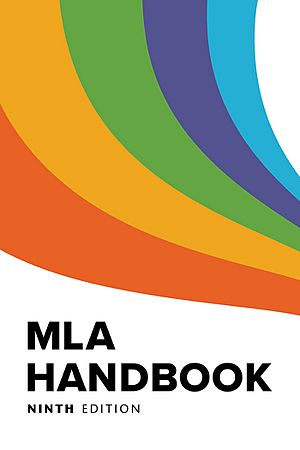MLA style facts for kids

MLA Handbook, 9th ed.
|
|
| Original title | MLA Handbook for Writers of Research Papers |
|---|---|
| Country | United States |
| Language | English |
| Subject | Style guide |
| Publisher | Modern Language Association of America |
|
Publication date
|
2021 |
| Pages | xxx + 367 |
| ISBN | 9781603293518 |
| LC Class | LB2369 .M52 2021 |
MLA documentation style is used in scholarship throughout the humanities, especially in English studies, modern languages and literatures, comparative literature, literary criticism, media studies, cultural studies, and related disciplines.
MLA Style Manual was one of two books on MLA documentation style published by the MLA. While MLA Handbook is aimed at secondary and post-secondary students and their teachers, the intended audience of MLA Style Manual primarily consisted of graduate students, academic scholars, professors, professional writers, and editors.
History
MLA Handbook grew out of the initial MLA Style Sheet of 1951 (revised in 1970), a 28-page "more or less official" standard. The first five editions, published between 1977 and 1999 were titled MLA Handbook for Writers of Research Papers, Theses, and Dissertations. The 2003 sixth edition changed the title to MLA Handbook for Writers of Research Papers.
The seventh edition's main changes from the sixth edition were "no longer recogniz[ing] a default medium and instead call[ing] for listing the medium of publication [whether Print or Web or CD] in every entry in the list of works cited", recommending against listing URLs, and preferring italics over underline. Additionally, the seventh edition included a website with the full text of the book. Later online additions allowed for citation of e-books and tweets.
The eighth edition's main changes from the seventh edition are "shift[ing] our focus from a prescriptive list of formats to an overarching purpose of source documentation". Released in spring 2016, it changes the structure of the works cited list, most directly by adding abbreviations for volumes and issues (vol. and no.), pages (p. or pp.), not abbreviating words like "editor" or "translator", using URLs in most instances (though preferring DOI, as in APA), and not favoring the medium of publication. The ninth edition, in 2021, provides more examples, advises more inclusive language, and advises that URLs are optional, with DOI and permalinks being preferred. The ninth edition also provides rules for annotated bibliographies.
Editions
The table below identifies the year of publication of each edition of MLA Handbook.
| Edition | Year |
|---|---|
| 1 | 1977 |
| 2 | 1984 |
| 3 | 1988 |
| 4 | 1995 |
| 5 | 1999 |
| 6 | 2003 |
| 7 | 2009 |
| 8 | 2016 |
| 9 | 2021 |
See also
- Comparison of reference management software
- Parenthetical referencing
- APA style

